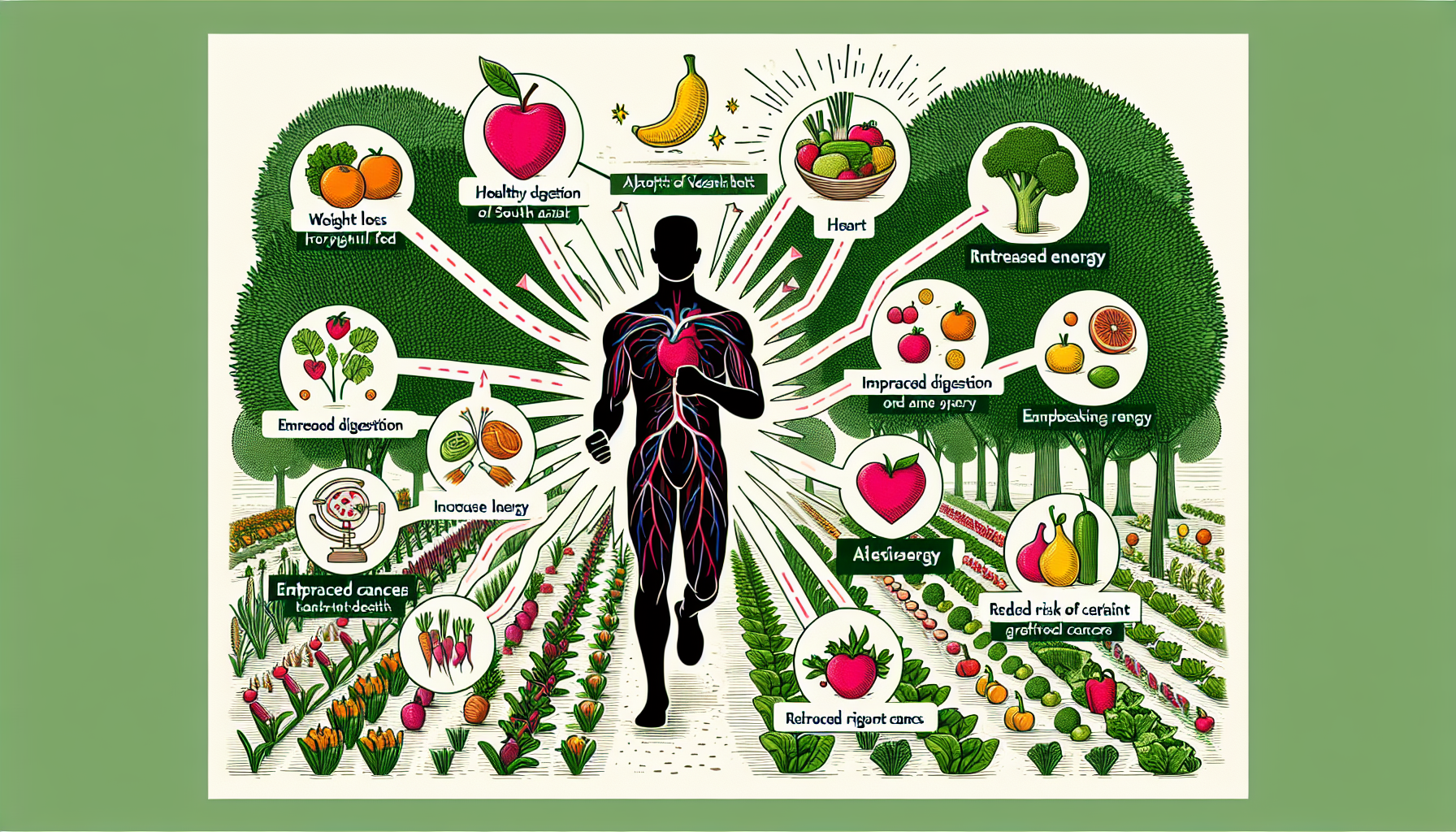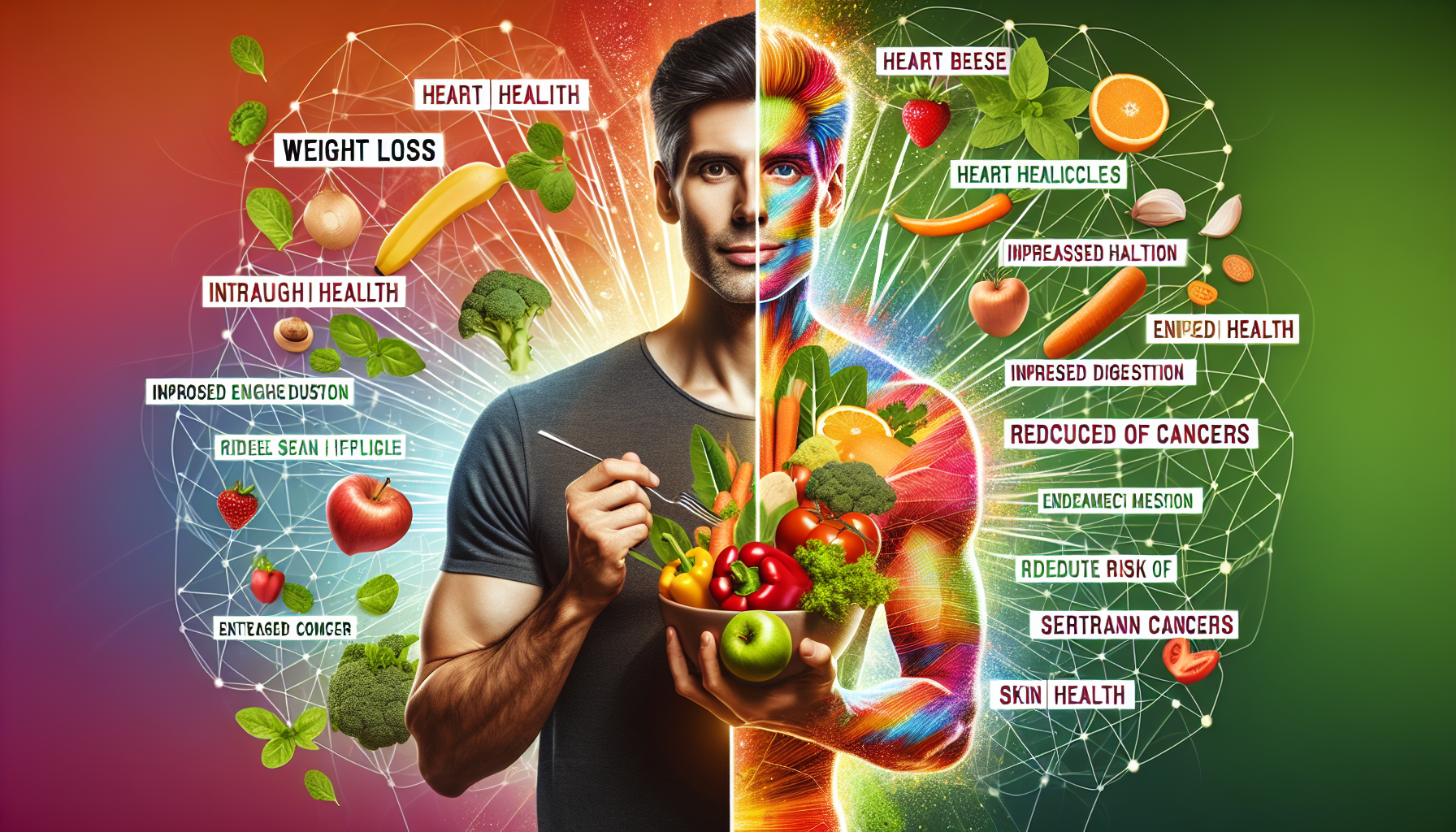Are you looking for a new way to improve your health and well-being? Look no further than the vegan lifestyle. By embracing a plant-based diet, you can experience a multitude of health benefits that will enhance your overall quality of life. From increased energy levels and weight management to improved heart health and a reduced risk of chronic diseases, the vegan lifestyle offers a wealth of advantages for both your body and mind. So, if you’re ready to embark on a new journey towards better health, join the countless individuals who have already discovered the incredible benefits of a vegan lifestyle.

Table of Contents
Improved Heart Health
Lowered cholesterol levels
Following a vegan lifestyle can lead to lowered cholesterol levels. Animal products, especially those high in saturated fats like red meat and full-fat dairy, can raise cholesterol levels. By eliminating these foods from your diet and focusing on plant-based options, you can significantly reduce your cholesterol levels. Plant-based foods are generally low in saturated fats and rich in healthy fats like monounsaturated and polyunsaturated fats, which can help improve your heart health.
Reduced risk of heart disease
Adopting a vegan lifestyle can also reduce your risk of heart disease. High cholesterol, high blood pressure, and inflammation are all risk factors for heart disease, and by following a plant-based diet, you can address these factors. Plant-based foods are naturally cholesterol-free and low in sodium, helping to maintain healthy blood pressure levels. Additionally, the high fiber content of a vegan diet is beneficial in reducing cholesterol and promoting heart health.
Lower blood pressure
High blood pressure is a common health concern that can have serious implications for your heart health. By embracing a vegan lifestyle, you can potentially lower your blood pressure levels. Plant-based foods are naturally low in sodium and high in potassium, which helps to regulate blood pressure. The abundance of fruits, vegetables, whole grains, and legumes in a vegan diet ensures that you receive an adequate intake of these beneficial nutrients, contributing to lower blood pressure readings.
Weight Management
Easier weight control
Maintaining a healthy weight becomes easier when you adopt a vegan lifestyle. Plant-based diets tend to be lower in calorie density, meaning you can consume a larger volume of food for fewer calories. By focusing on whole, unprocessed plant foods, you can feel more satisfied with your meals while maintaining a calorie deficit, leading to weight loss or weight maintenance.
Lower body mass index (BMI)
Following a vegan diet has been associated with a lower body mass index (BMI). BMI is a measure of body fat based on your height and weight, and lower BMI values are generally indicative of a healthier weight. Plant-based diets, which are typically high in fiber, low in unhealthy fats, and rich in whole foods, can contribute to a healthier BMI and lower body weight.
Reduced risk of obesity
Obesity is a significant health concern that can lead to various chronic diseases and negatively impact overall well-being. By adopting a vegan lifestyle, you can reduce your risk of obesity. A vegan diet, when properly planned, promotes the consumption of nutrient-dense and low-calorie foods, making it easier to maintain a healthy weight and reduce the risk of obesity-related health conditions.
Lowered Cancer Risk
Reduced risk of certain types of cancer
Studies suggest that following a vegan lifestyle can potentially reduce the risk of certain types of cancer. Plant-based diets, rich in fruits, vegetables, whole grains, and legumes, provide a wide range of beneficial nutrients and phytochemicals that have been associated with lower cancer risk. Additionally, avoiding processed and red meats, which have been linked to an increased risk of certain cancers, can contribute to a decreased overall cancer risk.
Higher intake of antioxidants and phytochemicals
Antioxidants and phytochemicals are compounds found in plant-based foods that have been shown to have cancer-fighting properties. By adopting a vegan lifestyle, you can significantly increase your intake of these beneficial compounds. Fruits, vegetables, herbs, and spices are all excellent sources of antioxidants and phytochemicals, which can help protect your cells from damage and reduce the risk of developing cancer.
Decreased exposure to harmful toxins and carcinogens
Animal products, especially when processed or cooked at high temperatures, can contain carcinogens and other harmful substances that increase the risk of cancer. By choosing a vegan lifestyle, you can minimize your exposure to these toxins and carcinogens. Plant-based diets focus on whole, unprocessed foods, reducing the consumption of these harmful substances and promoting overall health and well-being.
Improved Digestive Health
Higher fiber intake
A vegan lifestyle can significantly increase your fiber intake, leading to improved digestive health. Plant-based foods, such as fruits, vegetables, whole grains, and legumes, are all excellent sources of dietary fiber. Fiber plays a crucial role in regulating digestion, promoting regular bowel movements, and preventing constipation. By including a variety of fiber-rich foods in your diet, you can ensure a healthy and well-functioning digestive system.
Reduced risk of constipation
Constipation can be uncomfortable and disruptive to your daily life. By adopting a vegan lifestyle and consuming ample amounts of fiber, you can reduce your risk of experiencing constipation. Fiber adds bulk to your stool, making it easier to pass through the digestive tract and preventing constipation. Additionally, plant-based foods often contain natural enzymes that aid in digestion and promote regularity.
Improved gut health
A vegan lifestyle can also contribute to improved gut health. Plant-based diets are rich in prebiotic fibers, which serve as fuel for the beneficial bacteria in your gut. These fibers help promote a healthy balance of gut bacteria, which is essential for optimal digestion, nutrient absorption, and overall gut health. By nourishing your gut with a variety of plant-based foods, you can support a thriving and diverse gut microbiome.

Reduced Risk of Chronic Diseases
Lower risk of type 2 diabetes
Type 2 diabetes is a prevalent and potentially debilitating chronic disease. By following a vegan lifestyle, you can reduce your risk of developing type 2 diabetes. Plant-based diets are typically low in unhealthy fats, high in fiber, and rich in complex carbohydrates, all of which contribute to better blood sugar control. Additionally, plant-based diets have been shown to improve insulin sensitivity, reducing the likelihood of developing diabetes.
Decreased risk of hypertension
Hypertension, or high blood pressure, is a risk factor for various chronic diseases, including heart disease and stroke. By adopting a vegan lifestyle, you can decrease your risk of developing hypertension. Plant-based diets, abundant in fruits, vegetables, whole grains, and legumes, are naturally low in sodium and high in potassium, two essential minerals for maintaining healthy blood pressure levels.
Reduced chance of developing metabolic syndrome
Metabolic syndrome is a cluster of conditions that increase the risk of heart disease, stroke, and type 2 diabetes. Following a vegan lifestyle can decrease your chance of developing metabolic syndrome. Plant-based diets have been shown to improve insulin sensitivity, enhance lipid profiles, and lower blood pressure, all of which are important components of metabolic health. By adopting a vegan lifestyle, you can take proactive steps towards preventing metabolic syndrome.
Increase in Nutrient Intake
Higher consumption of fruits and vegetables
A significant benefit of a vegan lifestyle is the increased consumption of fruits and vegetables. These plant-based foods are rich in essential vitamins, minerals, antioxidants, and phytochemicals, all of which are necessary for optimal health and functioning of your body. By prioritizing fruits and vegetables in your diet, you can ensure that you receive an abundance of these nutrients, supporting optimal well-being.
Increased intake of essential vitamins and minerals
Adopting a vegan lifestyle often leads to an increased intake of essential vitamins and minerals. Plant-based foods, such as leafy greens, legumes, whole grains, nuts, and seeds, are excellent sources of nutrients like vitamin C, vitamin E, folate, magnesium, and potassium. These nutrients are essential for various bodily functions and contribute to overall health and vitality.
Greater variety in food choices
Following a vegan lifestyle opens up a world of culinary possibilities and encourages you to explore a greater variety of foods. With an emphasis on plant-based ingredients, you can experiment with different grains, legumes, fruits, vegetables, herbs, spices, and plant-based alternatives. This expanded variety not only adds excitement to your meals but also increases your nutrient intake by exposing you to a wider range of vitamins, minerals, and phytochemicals.
Enhanced Weight Loss
Higher fiber and water content in plant-based foods
Plant-based foods, such as fruits, vegetables, whole grains, and legumes, are typically high in fiber and water content. These qualities contribute to enhanced weight loss efforts. Fiber and water help increase satiety and can help you feel fuller for longer, reducing the chances of overeating or snacking on unhealthy options. By incorporating more plant-based foods into your diet, you can support your weight loss goals effectively.
Improved satiety and reduced calorie intake
One of the significant advantages of a vegan lifestyle when it comes to weight loss is the improved satiety it provides. Whole, plant-based foods are generally less calorie-dense than their processed counterparts and can be more filling. By consuming meals and snacks rich in plant-based proteins, healthy fats, and complex carbohydrates, you can feel satisfied on fewer calories and reduce overall calorie intake, promoting weight loss.
Increased metabolism from plant-based proteins
Plant-based proteins, such as legumes, tofu, tempeh, and seitan, can boost your metabolism, further supporting weight loss efforts. Proteins have a higher thermic effect compared to fats and carbohydrates, meaning your body burns more calories during the digestion process. By incorporating plant-based proteins into your meals, you can increase your metabolism and more effectively burn calories, aiding in weight loss.
Improved Blood Sugar Control
Lower blood sugar levels
Maintaining stable blood sugar levels is crucial for overall health, especially for individuals with diabetes. Following a vegan lifestyle can help lower blood sugar levels. Plant-based diets, particularly those focused on whole, unprocessed foods, are low in refined sugars and simple carbohydrates, which can cause spikes in blood sugar. By prioritizing complex carbohydrates, fibers, and whole foods, you can experience better blood sugar control.
Reduced risk of insulin resistance
Insulin resistance occurs when cells become less responsive to the hormone insulin, leading to elevated blood sugar levels. By adopting a vegan lifestyle, you can reduce your risk of developing insulin resistance. Plant-based diets have been shown to enhance insulin sensitivity, allowing your cells to effectively utilize insulin and regulate blood sugar levels. This can help prevent the onset of type 2 diabetes and promote overall metabolic health.
Improved glycemic control for individuals with diabetes
For individuals with diabetes, maintaining proper glycemic control is essential. Embracing a vegan lifestyle can have significant benefits for managing blood sugar levels in diabetes. Plant-based diets, when properly planned, provide a wealth of nutrients, fiber, and complex carbohydrates that contribute to stable blood sugar levels. By working with a healthcare professional or a registered dietitian, you can create a vegan meal plan that meets your specific needs and supports optimal glycemic control.
Reduced Inflammation
Higher intake of anti-inflammatory foods
Inflammation is the body’s natural response to injury or infection, but chronically elevated inflammation levels can contribute to various chronic diseases. Following a vegan lifestyle can increase your intake of anti-inflammatory foods, helping to reduce inflammation in your body. Fruits, vegetables, whole grains, nuts, seeds, and spices like turmeric and ginger are all known for their anti-inflammatory properties, and incorporating them into your diet can support better overall health.
Lower levels of C-reactive protein (CRP)
C-reactive protein (CRP) is a marker of inflammation in the body. High levels of CRP are associated with an increased risk of chronic diseases, such as heart disease and certain cancers. By adopting a vegan lifestyle, you can lower your levels of CRP. Plant-based diets, rich in antioxidants, fiber, and phytochemicals, have been shown to reduce inflammation markers like CRP, promoting better health and reducing the risk of inflammatory diseases.
Reduced risk of inflammatory diseases
Chronic inflammation is a contributing factor to many common diseases, including cardiovascular disease, arthritis, and certain types of cancer. By following a vegan lifestyle, you can reduce your risk of developing these inflammatory diseases. Plant-based diets provide an abundance of nutrients, antioxidants, and anti-inflammatory compounds that work synergistically to combat inflammation, supporting your body’s natural defense mechanisms and promoting overall well-being.
Lower Environmental Impact
Reduced greenhouse gas emissions
One of the lesser-known benefits of a vegan lifestyle is its positive impact on the environment. Animal agriculture is a significant contributor to greenhouse gas emissions, mainly through methane released by livestock. By choosing a plant-based diet, you can significantly reduce your carbon footprint and help mitigate climate change. Plant-based foods generally require fewer resources, such as land, water, and energy, making them a more environmentally sustainable option.
Conservation of water resources
Animal agriculture requires significant amounts of water, both for the animals themselves and for growing the crops needed to feed them. By adopting a vegan lifestyle, you can contribute to the conservation of water resources. Plant-based diets generally have a lower overall water footprint since plant-based foods require less water for production compared to animal products. Choosing plant foods helps ensure the availability of water resources for future generations.
Mitigation of deforestation and land degradation
The expansion of animal agriculture often leads to deforestation and land degradation, as forests are cleared to make way for grazing and feed crop cultivation. By embracing a vegan lifestyle, you can actively support the mitigation of deforestation and land degradation. Plant-based diets rely less on land use and can help preserve natural habitats, protect biodiversity, and maintain the ecological balance of our planet.
In conclusion, adopting a vegan lifestyle offers a multitude of health benefits. From improved heart health to weight management, reduced cancer risk to enhanced digestive health, and a decreased risk of chronic diseases to an increase in nutrient intake, the advantages are numerous. Additionally, a vegan lifestyle can aid in weight loss, blood sugar control, and reducing inflammation. Not only does it benefit individual health, but it also has a positive impact on the environment by reducing greenhouse gas emissions, conserving water resources, and mitigating deforestation and land degradation. By making the decision to embrace a vegan lifestyle, you can improve your well-being and contribute to a more sustainable world.






